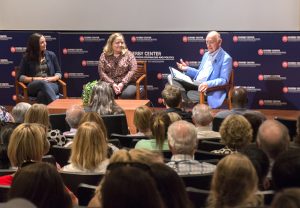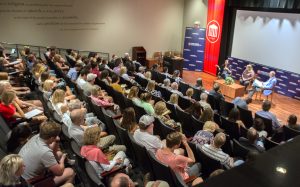“In the Dark” podcast senior producer Samara Freemark and host Madeleine Baran attracted a near-capacity audience to the Overby Center for Southern Journalism and Politics on Wednesday evening.
Their podcast investigates the arrest and trial of Curtis Flowers, a man who has been tried six times for his alleged involvement in a 1996 quadruple murder at a furniture store in Winona.

Madeleine Baran and Samara Freemark speak at the Overby Center on Wednesday about their podcast, which focuses on the case of Curtis Flowers, a man who has been tried six times for murder and is currently appealing his most-recent conviction. Photo by Parker Galloway
“The reason he’s been tried this many times is … (that) although the higher courts have, several times, found that the prosecutor engaged in misconduct, that does not stop the prosecutor from being able to try the case again,” Baran said. “So in this case, the (District Attorney) Doug Evans has just decided to keep trying the case.”
Flowers has been incarcerated for the crime since 1997. The first three times Flowers was tried, he was found guilty and sentenced to death, but each of those decisions was overturned by the Mississippi Supreme Court because of prosecutorial misconduct during jury selection. The fourth and fifth trials Flowers faced ended in jury deadlock and, therefore, no conviction. In his sixth and final trial for his alleged role in the homicides, Flowers was convicted and sentenced to death in a decision that has been upheld and recently reaffirmed by the state Supreme Court.
“In the Dark” probes the prosecution of Curtis Flowers and those involved in the Winona incident through the 11 episodes of season two, each of which is approximately an hour long. The podcast investigates multiple aspects of the case, including jury selection, evidence and inmate confessions.
Season two of “In the Dark” seeks to answer why Flowers has been tried six times.
Charles Overby, chairman of the Overby Center, invited Freemark and Baran to campus and facilitated their discussion of the podcast with students and the campus community.
“Here at Ole Miss, this is a good forum to talk about this form of journalism and the subject at hand,” Overby said. “It shows students what can be done with a nontraditional media like podcasts.”
Overby said that the decline of print journalism is creating more opportunities for less-traditional journalism and said he was surprised by the podcast producers and reporters’ ability to cover the story in such depth.
“When you think about the 11 pieces — essentially one-hour a piece — if you transferred that into words, that would be like 40,000 words, which is like a small book,” Overby said.

The Overby Center hosts the team behind American Public Media’s “In the Dark” podcast on Wednesday. Photo by Parker Galloway
Baran said that to fully capture the story, the “In the Dark” team had to research the complexities of race and the criminal justice system of both the past and present “to get to that level of detail so that people really think about what it means that a place has gone through something like (the Flowers case).”
“This trial never ends with Curtis, so we were looking at this as something we don’t really think can happen,” Baran said. “We think that this must be some sort of check or something — that the criminal justice system intervenes to prevent a case from going on this long — but the reality is that there’s not.”
Flowers remains on death row at the Mississippi State Penitentiary. According to Tucker Carrington, the founding director of the Mississippi Innocence Project and Clinic at the University of Mississippi School of Law, Flowers is now being legally represented by the George C. Cochran Innocence Project, an organization within the University of Mississippi School of Law dedicated to exonerating the wrongfully convicted.






